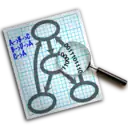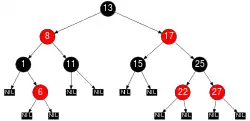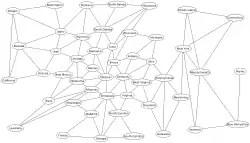Graphviz
Graphviz (short for Graph Visualization Software) is a package of open-source tools initiated by AT&T Labs Research for drawing graphs specified in DOT language scripts having the file name extension "gv". It also provides libraries for software applications to use the tools. Graphviz is free software licensed under the Eclipse Public License.
 | |
| Developer(s) | AT&T Labs Research and contributors[1] |
|---|---|
| Initial release | before 1991[2] |
| Stable release | 2.42.1[3]
/ 17 July 2019 |
| Repository | https://gitlab.com/graphviz/graphviz |
| Written in | C |
| Operating system | Linux, macOS, Windows |
| Type | Graph visualization |
| License | Eclipse Public License |
| Website | graphviz |

A red–black tree plotted by Graphviz.

Undirected graph showing adjacency of the 48 contiguous United States
Software architecture
Graphviz consists of a graph description language named the DOT language[4] and a set of tools that can generate and/or process DOT files:
- dot
- a command-line tool to produce layered drawings of directed graphs in a variety of output formats, such as (PostScript, PDF, SVG, annotated text and so on).
- neato
- useful for undirected graphs. "spring model" layout, minimizes global energy. Useful for graphs up to about 1000 nodes
- fdp
- useful for undirected graphs. "spring model" which minimizes forces instead of energy
- sfdp
- multiscale version of fdp for the layout of large undirected graphs
- twopi
- for radial graph layouts. Nodes are placed on concentric circles depending their distance from a given root node
- circo
- circular layout. Suitable for certain diagrams of multiple cyclic structures, such as certain telecommunications networks
- dotty
- a graphical user interface to visualize and edit graphs.
- lefty
- a programmable (in a language inspired by EZ[5]) widget that displays DOT graphs and allows the user to perform actions on them with the mouse. Therefore, Lefty can be used as the view in a model–view–controller GUI application that uses graphs.
- gml2gv - gv2gml
- convert to/from GML, another graph file format.
- graphml2g
- convert a GraphML file to the DOT format.
- gxl2gv - gv2gxl
- convert to/from GXL, another graph file format.
Applications that use Graphviz
Notable applications of Graphviz include:
- ArgoUML's alternative UML Diagram rendering called argouml-graphviz.[6]
- AsciiDoc can embed Graphviz syntax as a diagram.
- Bison is able to output the grammar as dot for visualization of the language.[7]
- ConnectedText has a Graphviz plugin.
- Doxygen uses Graphviz to generate diagrams, including class hierarchies and collaboration for source code.[8]
- FreeCAD uses Graphviz to display the dependencies between objects in documents.[9]
- Gephi has a Graphviz plugin.
- Gramps uses Graphviz to create genealogical (family tree) diagrams.
- Graph-tool a Python library for graph manip and visualization.
- OmniGraffle version 5 and later uses the Graphviz engine, with a limited set of commands, for automatically laying out graphs.[10]
- Org-mode can work with DOT source code blocks.[11]
- PlantUML uses Graphviz to generate UML diagrams from text descriptions.
- Puppet can produce DOT resource graphs that can be viewed with Graphviz.
- Scribus is an Open Source DTP program that can use Graphviz to render graphs by using its internal editor in a special frame type called render frame.[12]
- Sphinx is a documentation generator that can use Graphviz to embed graphs in documents.
- TOra a free software database development and administration GUI, available under the GNU GPL.
- Trac wiki has a Graphviz plugin.[13]
- Zim includes a plugin that allows adding and editing in-page diagrams using the Graphviz dot language.[14]
References
- "Credits Graphviz".
- Eleftherios Koutsofios and Stephen North. Drawing graphs with dot. Technical Report 910904-59113-08TM, AT&T Bell Laboratories, Murray Hill, New Jersey, September 1991.
- https://gitlab.com/graphviz/graphviz/raw/master/ChangeLog; retrieved: 5 September 2019.
- The DOT Language
- The Lefty guide (“Editing Pictures with lefty”), section 3.1, p. 9.
- "argouml-graphviz.tigris.org". argouml-graphviz.tigris.org. Retrieved 15 January 2018.
- Naumann, Uwe (2012). The Art of Differentiating Computer Programs: An Introduction to Algorithmic Differentiation. SIAM. p. 181. ISBN 9781611972078. Retrieved 15 January 2018.
- Anderson, Fritz (2014). Xcode 5 Start to Finish: iOS and OS X Development. Addison-Wesley Professional. p. 425. ISBN 9780133751024. Retrieved 15 January 2018.
- "Std DependencyGraph". FreeCAD web. Retrieved 18 July 2018.
- https://support.omnigroup.com/documentation/omnigraffle/mac/7.6/en/opening-and-importing-files-in-omnigraffle/#supported-dot-syntax
- Voit, Karl. "Org tutorial on generating simple process diagrams using dot and tables". orgmode.org. Retrieved 15 January 2018.
- Gemy, Cedric (2010). Scribus 1.3.5 Beginner's Guide. Packt Publishing Ltd. ISBN 9781849513012. Retrieved 15 January 2018.
- "GraphvizPlugin – Trac Hacks - Plugins Macros etc". trac-hacks.org. Retrieved 15 January 2018.
- "Zim - a desktop wiki: Diagram Editor". zim-wiki.org. Retrieved 15 January 2018.
External links
- Official website
- graphviz on GitLab
- Graphviz, Projects & Software Page, AT&T Labs Research
- An Introduction to Graphviz and dot (M. Simionato, 2004)
- Create relationship diagrams with Graphviz (Shashank Sharma, 2005)
This article is issued from Wikipedia. The text is licensed under Creative Commons - Attribution - Sharealike. Additional terms may apply for the media files.